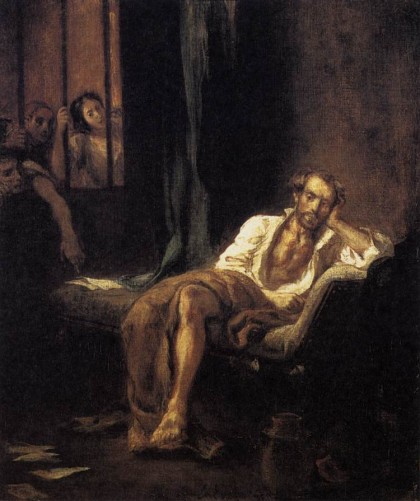Posted March 24th, 2015 at 10:02 amNo Comments Yet

Poetic licence
Justified as the killing of Maria d’Avalos and Fabrizio Carafa may have been considered in legal terms, the event caused a scandal, and most contemporary accounts and responses sided with the dead lovers. Many of the reactions were tabloidesque in their opinions and fabrications, but the fate of the ‘victims’, who were both well known members of society and both considered highly attractive, caught the public imagination.
As Gesualdo hid in his remote castle to avoid revenge from the lovers’ families (he is said to have cut down all the trees, so as to have fair warning of any approach), his sense of insecurity can only have been heightened by the ‘unjust’ favour showed to those who had done him wrong. Few responses can have felt more disloyal than the poems written by Gesualdo’s friend, Torquato Tasso.
–
On the death of two most noble lovers
Weep, O Graces, and you weep too, O Loves,
The cruel trophies of death, and the cruel spoils
Of the beautiful couple whom death enviously takes from us,
Both the funereal pomps and the shadowy horrors.
Weep, O Nymphs, and strew blossoms on them,
Their moist leaves painted with old laments;
And all ye who compete to distill
The piteous anguish and the scent of tears.
Weep, Erato and Clio, for this horrible event,
and henceforth scatter with mournful sound your bitter complaint
Instead of fresh water, O Parnassus.
Weep, sad Naples, clothed in mourning,
For the dark fate of beauty and of virtue,
And may the song address its harmony to grief.
–
It is ironic that Tasso, a victim of paranoia himself, can only have exacerbated Gesualdo’s sense of injustice and vulnerability with this and his other writings on the subject.
Those inclined to think that Gesualdo’s own work was written out of guilt might see Tasso’s words as a call to action from the composer. In truth, however, Gesualdo set almost none of the many poems that Tasso wrote specifically for him in the years that followed.
–
In morte di due Nobilissimi Amanti
Piangete o Grazie, e voi piangete Amori,
Feri trofei di morte, e fere spoglie
Di bella coppia cui n’invidia e toglie,
E negre pompe e tenebrosi orrori.
Piangete o Ninfe, e in lei versate i fiori
Pinti d’antichi lai l’umide foglie
E tutte voi che le pietose doglie
Stillate a prova e lacrimosi odori.
Piangete Erato e Clio l’orribil caso
E sparga in flebil suono amaro pianto
In vece d’acque dolci o mai Parnaso.
Piangi Napoli mesta in bruno ammanto,
Di beltà di virtù l’oscuro occaso
E in lutto l’armonia rivolga il canto.